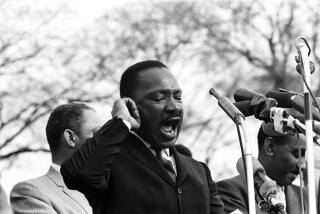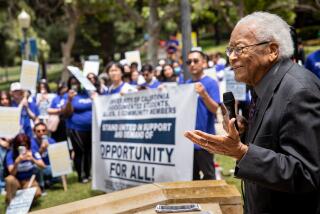Guy Carawan dies at 87; brought ‘We Shall Overcome’ to civil rights movement
- Share via
Folk singer Guy Carawan didn’t write “We Shall Overcome,” the galvanizing anthem of the civil rights movement that the Library of Congress called “the most powerful song of the 20th century.” In fact, its origins remain unclear.
But it was the Santa Monica-born Carawan who introduced the song to civil rights workers in the South in April 1960.
“During the next few months it was not a song,” legendary singer Pete Seeger said in a 2010 interview. “It was the song.”
Carawan, 87, died Saturday in New Market, Tenn. He was suffering from a form of dementia, said his wife, Candie Carawan.
Some music historians believe that the song was derived from the hymn “I’ll Overcome Some Day,” included in an early 1900s collection by Charles Tindley, an African American pastor in Philadelphia. (In that same Tindley collection was “Stand By Me,” the basis for a 1961 hit song by Ben E. King, who died April 30).
Others say the credit should go to hymn composer Louise Shropshire, whose “If My Jesus Wills” contains the phrase, “I do believe, I’ll overcome someday.”
In any regard, the lyrics and music of what became “We Shall Overcome” evolved over decades.
“I first heard the song from a friend of mine, Frank Hamilton,” Carawan said in a 1999 National Public Radio documentary. In the 1950s, Carawan was getting his master’s degree in sociology at UCLA and also performing folk music. Hamilton later performed with the famed folk group The Weavers.
Carawan became a volunteer at the Highlander center in rural Tennessee that was devoted to union and civil rights activities. The center emphasized music as a unifying force, and at a three-day conference in April 1960, Carawan taught civil rights protesters several songs, including “Eyes on the Prize” and “I’m Gonna Sit at the Welcome Table.”
But it was “We Shall Overcome” that most resonated with the crowd.
“It was so hopeful, so beautiful,” said Candie Carawan, who met her future husband at that conference. “It was electrifying.”
Two weeks later, he performed by invitation at Shaw University, a historically black school in Raleigh, N.C. Again, “We Shall Overcome” was the sensation.
“Everyone stood up, crossed arms and sang,” she said.
The song spread like wildfire, becoming interwoven with the movement — it was sung during nationally televised demonstrations, in cellblocks and at funerals. The Rev. Martin Luther King Jr. invoked it in some of his most famous speeches.
“It is one of the most powerful, at the same time, sacred moment when we would say ‘we shall overcome,’ ” movement leader John Lewis, now a member of Congress from Georgia, said in the NPR documentary. “Especially if you had been beaten and arrested and jailed and thrown into a paddy wagon, thrown into some waiting area and the group just stands there and sings together, ‘We Shall Overcome.’ It gave you a sense of faith, a sense of strength to continue to struggle, to continue to push on.”
Carawan didn’t only introduce the song to the movement, he took part in it. In 1963, he and Candie were arrested during a demonstration in Birmingham, Ala. According to Taylor Branch’s 1988 book, “Parting the Waters,” Andrew Young announced the arrests to a crowd of protesters.
“They are the ones,” Young lamented, “who taught us many of the songs that we sing in the movement.”
Carawan was born July 28, 1927. He graduated from John Marshall High School in Los Angeles, earned a bachelor’s degree at Occidental College in math and a master’s at UCLA in sociology.
He and Candie were married in 1961 in Claremont when she was a student at Pomona College. He taught at Pitzer College in Claremont from 1967 to 1972 in the sociology department. One of his classes was on the civil rights movement.
They wrote several books, recorded albums and took up new causes, including environmental damage from strip mining. They lived for two years on Johns Island in South Carolina, recording and chronicling traditional African American music.
He and Candie continued to perform on occasion, sometimes with their son, Evan, who plays hammer dulcimer. Their daughter, Heather, made a documentary, “The Telling Takes Me Home,” about her parents.
He remained fiercely devoted to the song. In 2003, during a performance at Occidental, he took offense when he felt students were taking the song lightly. “Too many people died to be smiling about this song,” he snapped.
Carawan will probably not be remembered as a pivotal figure in the civil rights movement, but the song he chose and sang in the right place at the right time reverberated to the highest level of government.
In 1965, when President Johnson addressed Congress on behalf of voting rights legislation, he said, “It is all of us who must overcome the crippling legacy of bigotry and injustice.
“And we shall overcome.”
Twitter: @davidcolker
More to Read
Start your day right
Sign up for Essential California for the L.A. Times biggest news, features and recommendations in your inbox six days a week.
You may occasionally receive promotional content from the Los Angeles Times.







